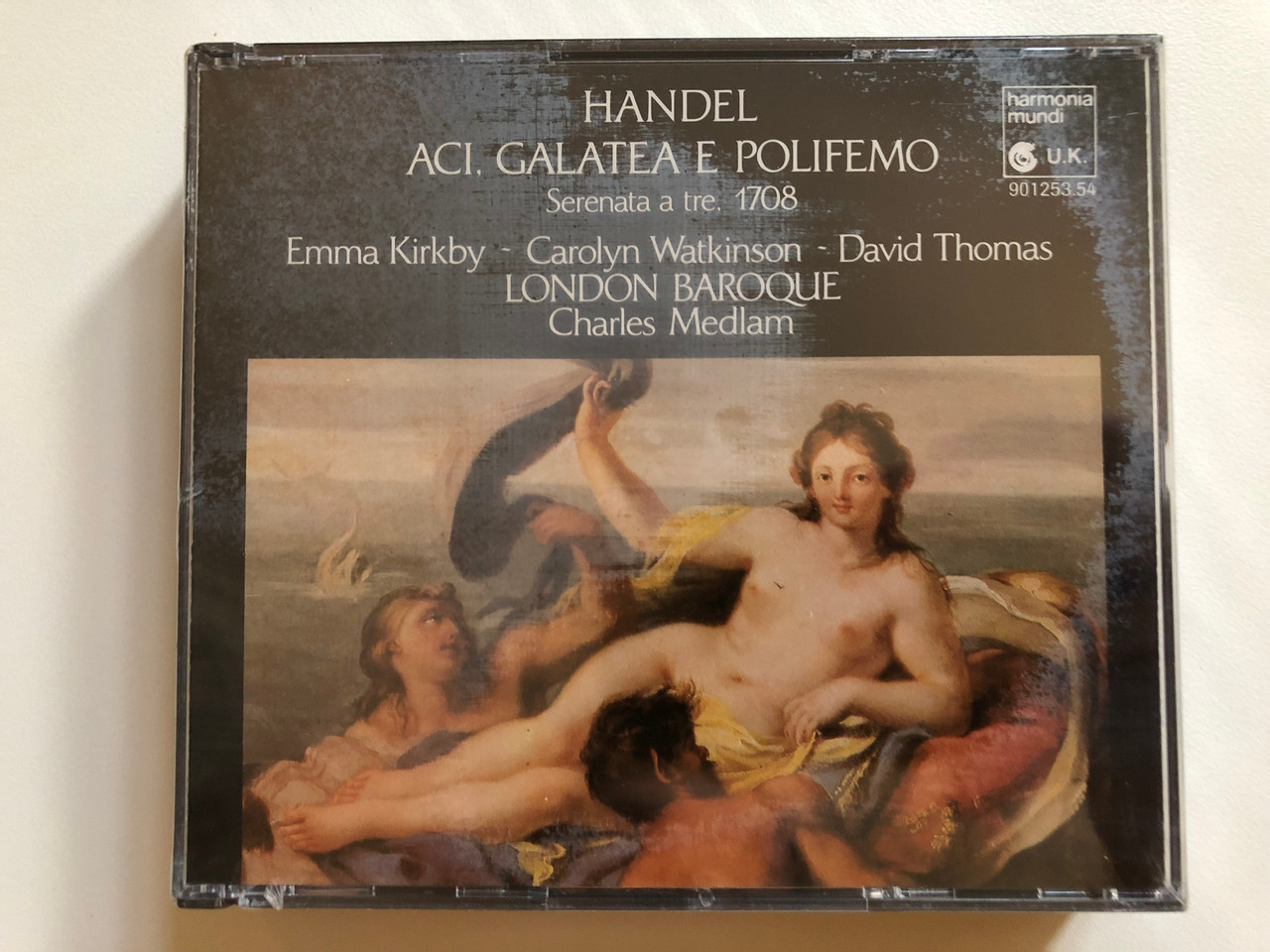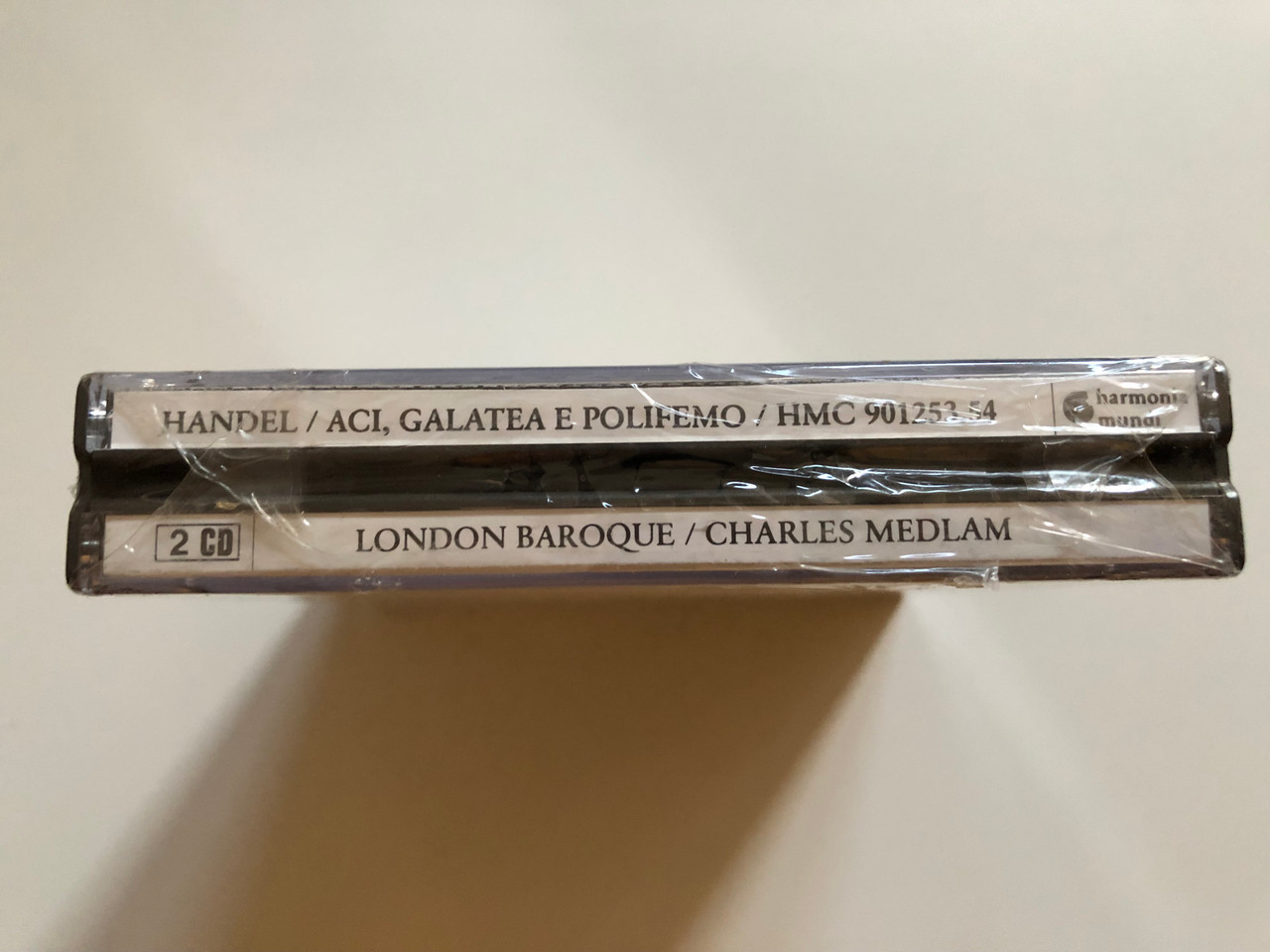Description
Handel: Aci, Galatea E Polifemo (Serenata A Tre, 1708) - Emma Kirkby, Carolyn Watkinson, David Thomas, London Baroque, Charles Medlam / Harmonia Mundi U.K. 2x Audio CD 1987 / 901253.54
UPC 3149021312536
Aci, Galatea e Polifemo (HWV 72) is a dramatic cantata—also called a serenata—by George Frideric Handel. It was first performed at Naples on 19 July 1708; the completed score is dated to 16 June 1708. The serenata was commissioned by Duchess Donna Aurora Sanseverino for the wedding festivities of the Duke of Alvito, Tolomeo Saverio Gallo, and Beatrice Tocco di Montemiletto, Princess of Acaja and niece of Aurora Sanseverino.
The Italian libretto was written by Nicola Giuvo, private secretary and literary adviser of Duchess Sanseverino. The plot is virtually the same as in Handel's later English-language pastoral opera Acis and Galatea, but Handel drew little on the music of the cantata when he returned to the story in 1718, although he did take care to introduce the half-lovable villain — the one-eyed giant Polyphemus — with another signature comic aria, faster and demanding virtuosity of a different kind than the one in Aci (see below), namely, "O ruddier than the cherry."
The role of Polifemo (Polyphemus), a cyclops whose actions have lethal consequences for Aci (Acis), is particularly notable for the vast range and singular vocal agility required. The part ranges from the D below the bass staff to the A above it — and that in his main satirical slow, ponderous buffa aria, "Fra l'ombre e gl'orrori". The role may have been taken at the premiere by the bass Antonio Manna, who sang at the court chapel in Vienna.
| Label: | Harmonia Mundi U.K. – 901253.54 |
|---|---|
| Format: |
2 x CD, Album
|
| Country: | W. Germany |
| Released: |
1987 |
| Genre: | Classical |
| Style: | Baroque |
Tracklist:
| 1-1 | Duetto Aci, Galatea: "Sorge Il Di" | 3:37 | |
| 1-2.1 | Recit.: "Vanti, O Cara" | ||
| 1-2.2 | Aria Galatea: "Sforzano A Piangere" | 6:19 | |
| 1-3.1 | Recit.: "E Qual Nova Sventura" | ||
| 1-3.2 | Aria Aci: "Che Non Può La Gelosia" | 5:09 | |
| 1-4 | Recit.: "Ma Qual Orrido Suono" | 1:11 | |
| 1-5 | Aria Polifemo: "Sibilar L'Angui D'Aletto" | 4:12 | |
| 1-6.1 | Recit.: "Deh, Lascia, Oh Polifemo" | ||
| 1-6.2 | Aria Galatea: "Benchè Tuoni E L'Etra Avampi" | 4:20 | |
| 1-7.1 | Recit.: "Cadrai Depressa" | ||
| 1-7.2 | Aria Polifemo: "Non Sempre, No, Crudele" | 2:52 | |
| 1-8.1 | Recit.: "Folle Quanto Mi Rido" | ||
| 1-8.2 | Aria Aci: "Dell'Aquila L'Artigli" | 4:36 | |
| 1-9.1 | Recit.: "Meglio Spiega" | ||
| 1-9.2 | Aria Polifemo: "Precipitoso Nel Mar" | 3:27 | |
| 1-10.1 | Recit.: "Si, T'Intendo Inumano" | ||
| 1-10.2 | Aria Galatea: "S'Agita" | 5:41 | |
| 1-11.1 | Recit.: "So Che Le Cinosure" | ||
| 1-11.2 | Aci, Galatea, Polifemo (A 3): "Proverà" | 2:39 | |
| 1-12.1 | Recit.: "Ingrata, Se Mi Nieghi" | ||
| 1-12.2 | Aria Polifemo: "Fra L'Ombre E Gl'Orrori" | 6:37 | |
| 1-13.1 | Recit.: "Ma Che?" | ||
| 1-13.2 | Aria Aci: "Qui L'Augel" | 7:19 | |
| 1-14.1 | Recit.: "Giunsi Al Fin Mio Tesoro" | ||
| 1-14.2 | Aria Galatea: "Se M'Ami, Oh Caro" | 5:01 | |
| 2-1.1 | Récitatif Polifemo, Aci, Galatea: "Qui Su L'Alto Del Monte" | ||
| 2-1.2 | Aci, Galatea, Polifemo (A 3): "Dolce Amico" | 3:37 | |
| 2-2.1 | Recit.: "Or Poichè Sordi Sono" | ||
| 2-2.2 | Polifemo: "Già Và Da Balza In Balza | 1:05 | |
| 2-3 | Recit. & Aria Aci: "Oh Dio, Mio Ben, Soccorso!" | 4:10 | |
| 2-4.1 | Recit.: "Misera, E Dove Sono?" | ||
| 2-4.2 | Aria Polifemo: "Impara, Ingrata" | 3:46 | |
| 2-5.1 | Recit.: "Ah Tiranno, Inumano!" | ||
| 2-5.2 | Aria Galatea: "Del Mar Fra L'Onde" | 3:12 | |
| 2-6 | Recit.: "Ferma! Ma Già Nel Mare" | 3:08 | |
| 2-7 | Aria Aci, Galatea, Polifemo (A 3): "Chi Ben Ama Ha Per Ogetti" | 1:19 | |
|
Sonates Pour Flûte À Bec Et Basse Continue |
|||
| Sonate En Fa Majeur, Op. 1 No. 11 | (7:00) | ||
| 2-8.1 | Larghetto | ||
| 2-8.2 | Allegro | ||
| 2-8.3 | Siciliana | ||
| 2-8.4 | Allegro | ||
|
Sonate En Do Majeur, Op. 1 No. 7 |
(9:57) |
||
| 2-9.1 | Larghetto | ||
| 2-9.2 | Allegro | ||
| 2-9.3 | Larghetto | ||
| 2-9.4 | A Tempo Di Gavotti | ||
| 2-9.5 | Allegro | ||
|
Sonate En Sol Majeur, Transposée En Fa Majeur |
(5:29) |
||
| 2-10.1 | Allegro | ||
| 2-10.2 | Adagio | ||
| 2-10.3 | Allegro |
- Bass Vocals [Polifemo] – David Thomas (9)
- Bassoon – Michael McCraw
- Cello – Charles Medlam (tracks: 2-8 to 2-10), Richard Tunnicliffe
- Composed By – Handel
- Contralto Vocals [Galatea] – Carolyn Watkinson
- Directed By – Charles Medlam
- Engineer [Prise de son] – Jean-François Pontefract
- Ensemble – London Baroque
- Harpsichord – John Toll
- Liner Notes – Jean-François Labie
- Music Director [Direction Artistique] – Michel Bernard
- Oboe – David Reichenberg, Valerie Darke
- Recorder – Anneke Boeke, Michel Piguet (tracks: 2-8 to 2-10), Rachel Beckett
- Soprano Vocals [Aci] – Emma Kirkby
- Text By [Translation Of Liner Notes And/Or Libretto] – Almut Lenz, Charles Johnston, Derek Yeld, François-Xavier Binnendijk
- Trumpet – Jonathan Impett, Stephen Keavy
- Viola – Jane Jorman, Theresa Caudle
- Violin – Francis Truner, Ingrid Seifert, Marie Knight (2), Peter Salem, Richard Gwilt, Sarah Bielby-Wright
- Violone – William Hunt


























